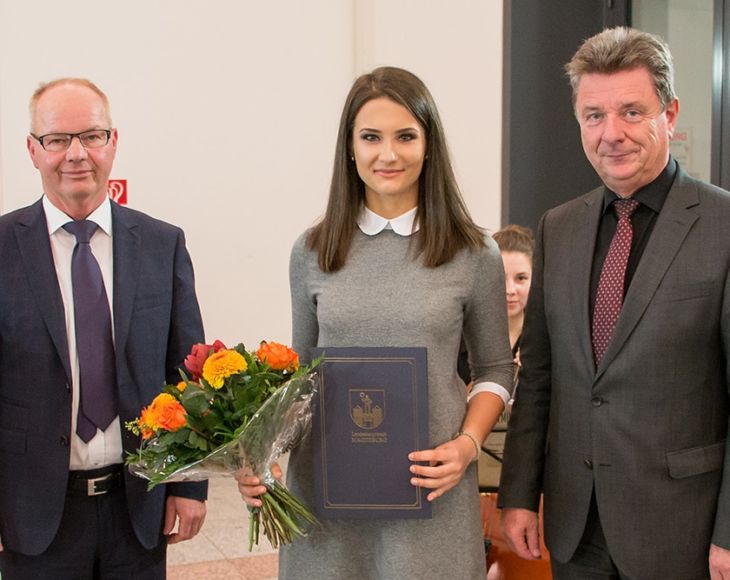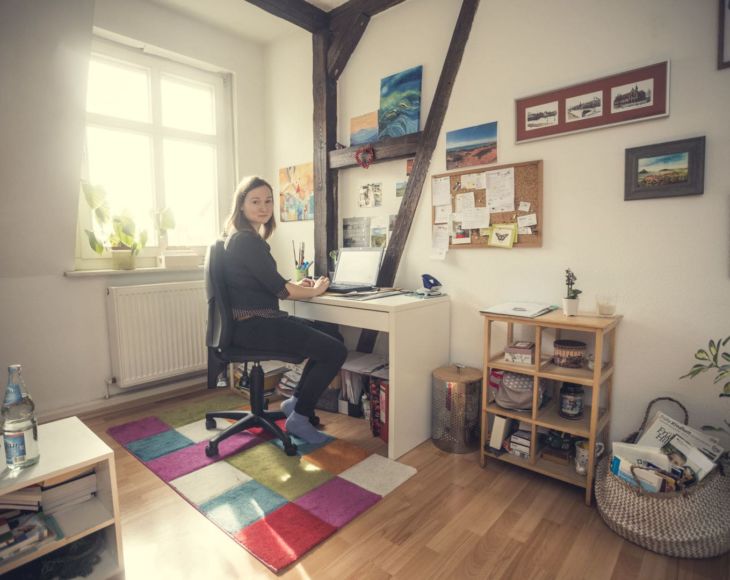Study in Germany
How much does it cost to study in Magdeburg and Stendal?
It does not cost a lot to live and study in Germany: the price of food, accommodation, clothing, cultural activities and so on is significantly less than in other western European countries such as the Netherlands and the United Kingdom. If you want to study in Germany, the monthly costs can vary considerably. Where a student in Magdeburg or Stendal pays rent of €250 on average, the costs in, for example, Munich (€630), Frankfurt (€500) and Cologne (€430) are far higher. On average you will need around €450 per month for living expenses (subsistence and accommodation) in Magdeburg or Stendal. Our university does not charge tuition fees. Students only pay a semester fee of €158,50 in Stendal or €153,70 in Magdeburg (this includes a public transport for Magdeburg). So, as you can see, university education in Germany need not be expensive!


Working during and after your studies in Germany
The minimum wage in Germany is currently €9.60 per hour. Students often work under the so-called mini-job rule, under which they can earn up to €450 per month without paying tax or contributions to a retirement insurance scheme.
Thanks to close contacts with local/German and international industrial partners, our students benefit early on from practical experience and important contacts for their professional lives. In addition, over 200 companies recruit students at the annual job fair on the university’s campus with lucrative job offers. The contacts made during students’ degree programmes often lead to a seamless entry into the world of work for graduates as well as higher starting salaries compared to traditional university degrees. Engineering specialists are in particularly high demand in industry, whilst worldwide a German education is very highly regarded.
Scholarships
Study ambassador at the first semester
School pupils from abroad can apply for the BIDS scholarship before they commence their studies. The scholarship provides financial support amounting to €325 per month for the first semester of studies. By receiving the scholarship, they also act as study ambassadors in their home country.
Scholarships from the 2nd year of study
International students can apply for the following scholarships, awarded by the university, from the 2nd year of study:
- Otto von Guericke Scholarship (€500/month for one year) awarded with the city of Magdeburg
- Deutschlandstipendium (Germany Scholarship) (€300/month for one year)
- DAAD prize (a one-off payment of €1000) supported by the German Academic Exchange Service (DAAD) with funds from the Federal Foreign Office
DAAD scholarship for international Master’s students
Students from abroad who would like to complete a full Master’s programme at Magdeburg-Stendal University of Applied Sciences can apply for funding from the DAAD: Funding of 861 euros per month plus additional costs is available for a study period of 10 to 24 months.
Further information can be found at the DAAD


Accommodation during your studies
Like in many universities in Germany, students live either in a student hall of residence or a room in a shared apartment. Rent costs between 200 and 280 euros per month.
Once you have received an offer of a study place, you will need to look for accommodation yourself. The university can help with the search.
There is sufficient value-for-money accommodation in both Magdeburg and Stendal. In Germany, shared apartments (known as Wohngemeinschaften or WGs) are especially popular among students as they complete their education. Several students live together in an apartment. Each has their own room, but all of them share the kitchen and bathroom. The advantages are that living in a WG is cheap, it is easy to get to know other people and often also to improve your German language skills. Magdeburg is one of Germany’s cheapest cities and offers plenty of options for studying or training in Germany.
Medical Care
The German healthcare system is considered to be one of the best in the world. Anyone studying at a German university or university of applied sciences must be insured by a health insurance scheme, either in Germany or abroad. A foreign health insurance scheme must match the minimum standards of a German health insurance provider.
In case of emergency, assistance is available as well as emergency admission to hospital. The services required are free of charge for insured persons. An emergency doctor or ambulance can be reached at any time on the freephone number 112.
Visa
- Nationals of EU member states do not need a visa to study in Germany
- Nationals of non-EU states can find the current visa requirements on the website of the German Federal Foreign Office
Students who are citizens of non-EU countries must demonstrate when applying for a visa that they have sufficient financial means (currently €861 per month) for the first year of their studies.


Applying to study in Germany
Application deadlines
Application for the winter semester (start: beginning of October) is possible every year from May.
Application for the summer semester (start: beginning of April) is possible every year from November.
The respective application deadline depends on the chosen study programme and the type of certificate. You can find out which deadline applies to your chosen study programme here: Application.
Language qualification for studies
German study programmes
Almost all study programmes at the university are taught in German.
For technical and business study programmes, proof of language level B2 is required.
For all other study programmes, proof of German language proficiency at the C1 level is required.
In addition to the DSD II certificate (B2 or C1 level), the university also accepts other language certificates.
English study programmes
The university’s two international degree programmes are taught in English:
- B. Eng. Sustainable Resources, Engineering and Management (StREaM)
- M. Eng. Water Engineering
For these study programmes, a level of proficiency in English at level B2 must be demonstrated.
VisaFlow Student Onboarding
To ensure a smooth transition to your new life in Magdeburg/Stendal, we would like to introduce you to VisaFlow.
VisaFlow is a platform designed to make the transition to Germany easier for international students. The app provides detailed, step-by-step guidance throughout the moving process to ensure no deadlines are missed and helps you through the sometimes complex bureaucratic procedures.
VisaFlow supports you in all aspects of settling into your new life as a student in Germany.
The best thing about it:
As a student at Magdeburg-Stendal University of Applied Sciences, VisaFlow is completely free of charge for you! Simply use the code ‘HSMDSDL25’ from Magdeburg-Stendal University of Applied Sciences to set up your free account on platform.visaflow.app.
In addition, you have the opportunity to connect with other international students who are on the same journey to Germany via VisaFlow’s student community. Join the conversation by using this link: VisaFlow WhatsApp Group.
